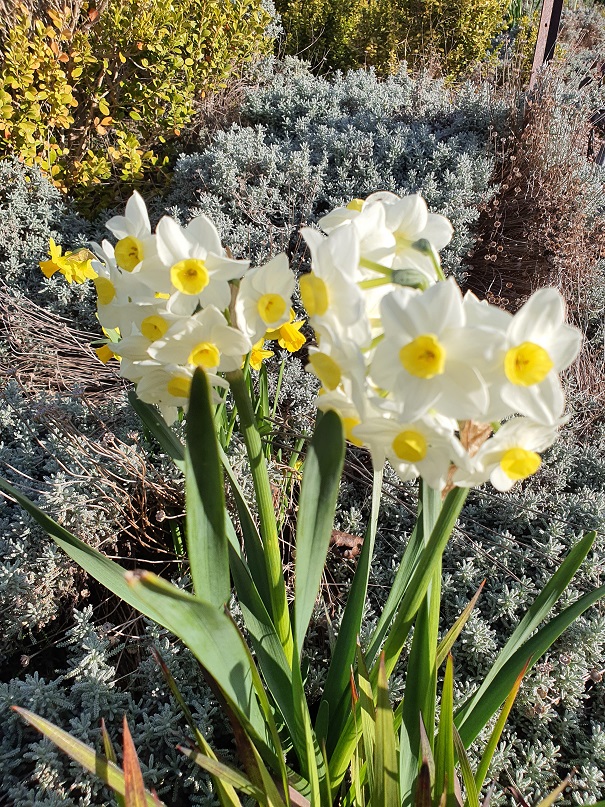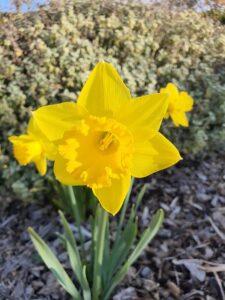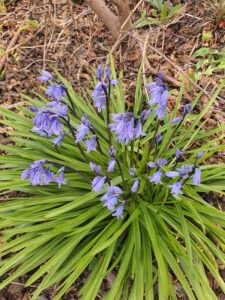
01 Sep Garden Tasks for Early Spring
Garden Tasks for Early Spring
*With the slightly warmer weather and regular showers of rain the weed growth is going to be powering on. Trying to keep on top of weed growth now should be a priority. In an ideal world, if you can try to set yourself up in a weeding and mulching program. It can be very overwhelming to look at your garden as one total entity that needs to be weeded. The best way to view your garden is to break your garden down into sections and try to maintain it in these sections. Weed one area at a time and then aim to spread mulch over the top of where you have weeded. Mulch will help to suppress the continual weed growth as well as helping retain moisture.
If you are really prepared and as an added bonus if you can spread some organic pelletised fertiliser such as Rooster Booster/Organic Life or Dynamic Lifter to your plants after weeding then, water this in well, then spread a layer of newspaper over the soil. The newspaper layer should be about 5 – 7 sheets thick and you should only use the traditional newspaper not the paper with the glossy finish. The newspaper layer water this in well and then spread the mulch on top. The mulch will also need to be watered in well. This combination will set you up for success in the Summer months. You may need to top up mulch through summer but overall weed growth should be slowed down and your plants will be grateful to have that extra layer of insulation on the hot days.
*Look at what perennials you have growing in the garden. Do they need lifting and dividing?
*Ornamental grasses such as Miscanthus, Calamagrostis and Panicum species will have dead seed heads. These seed heads along with the foliage should be cut back to ground level. Now is also the time to lift and divide these grasses.
*Remove any self – seeded plants that you don’t need in the garden.


*Citrus trees – If you haven’t already done so, remove all fruit from the trees and tip prune them. You should fertilise them now with a specific citrus food or an organic pelletised mix. Try to organise yourself to be in a routine to check for any pests or diseases that may need treatment on the plants. Also realise that now is the time next year’s fruit will start developing, so checking on the citrus trees watering requirements as the weather is starting to warm up.
*Roses will need to have their winter prune completed. We are approaching the time where most roses will also need an application of fertiliser. We like to use Sudden Impact for Roses. I would then mulch Roses after applying the fertiliser.
*If you would like to grow Dahlias in your garden, their tubers should be on the market soon – keep a look out for any varieties you might like to grow. They need to be planted into well draining rich organic soil ideally where they will receive morning sun and shelter from afternoon sun. Often the raised veggie garden planters are an ideal spot for them. Dahlia tubers should be in the ground by end of October the beginning of November at the very latest.
*Assess which vegetables you would like to grow for your warm season crops. I think the best way of selecting what to grow is to think about what you and your family or friends eat the most of. Try to grow the veggies that you want to eat. For example Brassica family crops do take up a lot of room in the veggies garden so if these aren’t veggies you will eat don’t dedicate valuable space to them. Some seeds you can start growing now are zucchini, cucumber, beans and corn. With the threat of frost in some areas you may need to grow these undercover.
*Stone fruits such as Cherries, Plums and Peaches will be starting to bloom. Apply fertiliser in spring, keep them well mulched and check on watering now as the weather is getting warmer. Watering and feeding now will help fruit production in summer. Also be on the look out for pests.
* Make sure your irrigation system is all working. I try to get into the habit of running ours once a week for a short time just to ensure it is working okay before the hot weather arrives later in the year.
*Dormant lawn species like Kikuyu will start growing again soon so making sure you have the lawn at the right level, the edges trimmed and a spray of a broadleaf herbicide will help get your grass off to a good start. Fertilising them now is a great idea too. Aim to spread the fertiliser just before rain so it will save you having to9 water it in. Be aware that any chemical fertiliser you use will burn the lawn if they are not watered in thoroughly.
* Start designing your summer flowering bulb garden.You can now start buying your summer flowering bulbs like all the Lilies, Gladiolus, Belladonna Lilies etc. . Remember if you don’t have space in a garden bed you could grow these in pots.



